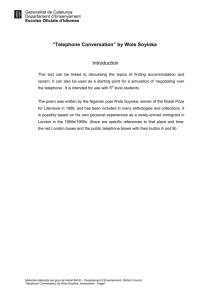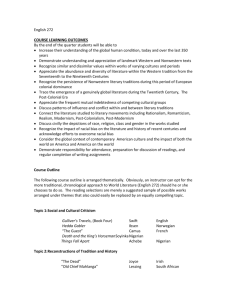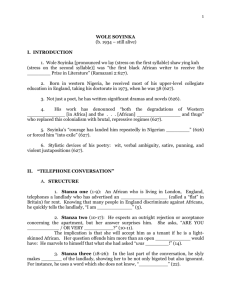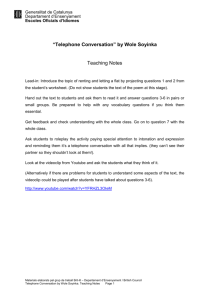Africa & Middle East World Literature Unit Plan
advertisement
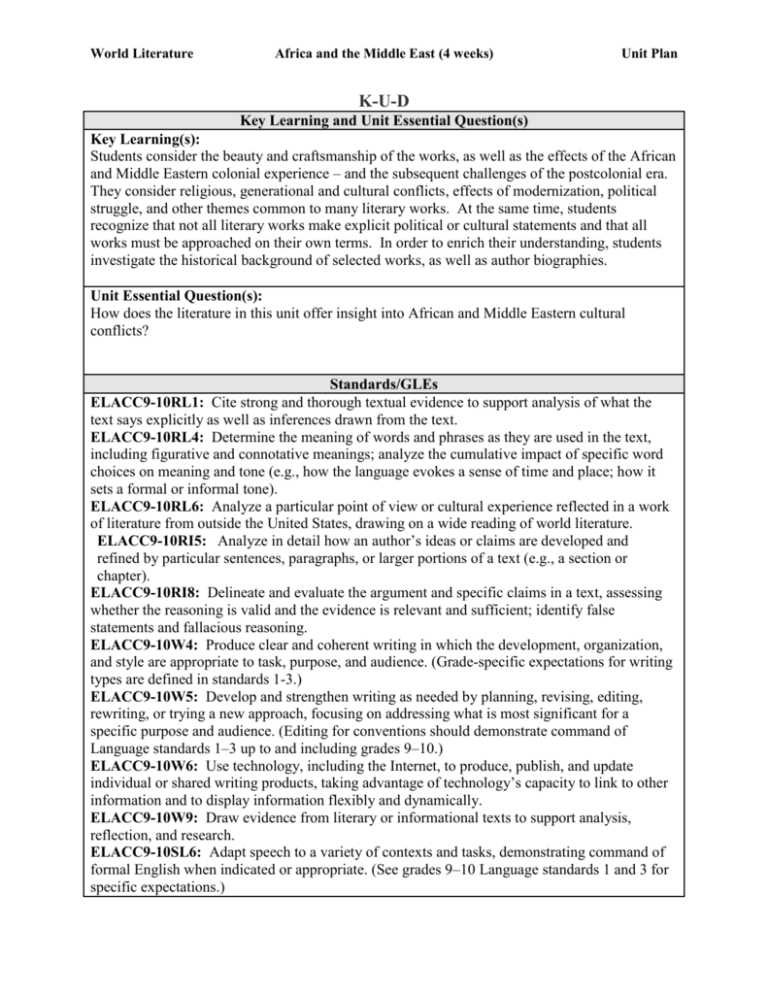
World Literature Africa and the Middle East (4 weeks) Unit Plan K-U-D Key Learning and Unit Essential Question(s) Key Learning(s): Students consider the beauty and craftsmanship of the works, as well as the effects of the African and Middle Eastern colonial experience – and the subsequent challenges of the postcolonial era. They consider religious, generational and cultural conflicts, effects of modernization, political struggle, and other themes common to many literary works. At the same time, students recognize that not all literary works make explicit political or cultural statements and that all works must be approached on their own terms. In order to enrich their understanding, students investigate the historical background of selected works, as well as author biographies. Unit Essential Question(s): How does the literature in this unit offer insight into African and Middle Eastern cultural conflicts? Standards/GLEs ELACC9-10RL1: Cite strong and thorough textual evidence to support analysis of what the text says explicitly as well as inferences drawn from the text. ELACC9-10RL4: Determine the meaning of words and phrases as they are used in the text, including figurative and connotative meanings; analyze the cumulative impact of specific word choices on meaning and tone (e.g., how the language evokes a sense of time and place; how it sets a formal or informal tone). ELACC9-10RL6: Analyze a particular point of view or cultural experience reflected in a work of literature from outside the United States, drawing on a wide reading of world literature. ELACC9-10RI5: Analyze in detail how an author’s ideas or claims are developed and refined by particular sentences, paragraphs, or larger portions of a text (e.g., a section or chapter). ELACC9-10RI8: Delineate and evaluate the argument and specific claims in a text, assessing whether the reasoning is valid and the evidence is relevant and sufficient; identify false statements and fallacious reasoning. ELACC9-10W4: Produce clear and coherent writing in which the development, organization, and style are appropriate to task, purpose, and audience. (Grade-specific expectations for writing types are defined in standards 1-3.) ELACC9-10W5: Develop and strengthen writing as needed by planning, revising, editing, rewriting, or trying a new approach, focusing on addressing what is most significant for a specific purpose and audience. (Editing for conventions should demonstrate command of Language standards 1–3 up to and including grades 9–10.) ELACC9-10W6: Use technology, including the Internet, to produce, publish, and update individual or shared writing products, taking advantage of technology’s capacity to link to other information and to display information flexibly and dynamically. ELACC9-10W9: Draw evidence from literary or informational texts to support analysis, reflection, and research. ELACC9-10SL6: Adapt speech to a variety of contexts and tasks, demonstrating command of formal English when indicated or appropriate. (See grades 9–10 Language standards 1 and 3 for specific expectations.) World Literature Africa and the Middle East (4 weeks) Unit Plan ELACC9-10L5: Demonstrate understanding of figurative language, word relationships, and nuances in word meanings. ELACC9-10L6: Acquire and use accurately general academic and domain-specific words and phrases, sufficient for reading, writing, speaking, and listening at the college and career readiness level; demonstrate independence in gathering vocabulary knowledge when considering a word or phrase important to comprehension or expression. - - - - - - - - KNOW history of the rise of Islam and its subsequent influences on Persia and Arabia art, culture, people and society of the Muslim world principle of monotheism understand tales, myths, legends, epics, songs, and proverbs understand elements of lyric poetry African Diaspora history of West Africa (rise and fall of empires and city-states, spread of Islam, slave trade and colonization. art, culture, people, and society of African countries cultural values of nonAmericans grammar, usage and mechanics conventions appropriate to grade level vocabulary terms and literary devices standards of writing (e.g., MLA format, research) Western perspectives on Africa and the Middle East UNDERSTAND The beauty and craftsmanship of the works, as well as the effects of the African and Middle Eastern colonial experience – and the subsequent challenges of the postcolonial era. Religious, generational and cultural conflicts, effects of modernization, political struggle, and other themes are common to many literary works. Not all literary works make explicit political or cultural statements and that all works must be approached on their own terms; historical background of selected works, as well as author biographies. - - - - - - - - DO Read a variety of literary works from Africa and the Middle East, particularly from the postcolonial period. Consider the challenges of translation, including the different connotations that various cultures attach to given words. Through analysis of literary works, explore the changing social structures of Middle Eastern and African societies. Explore various literary devices in plot development such as suspense, foreshadowing, symbolism, and extended metaphor. Trace the development of an idea or argument in a work of literary nonfiction. Offer insightful inferences regarding the themes of the text. Create a clear, original, specific thesis statement. Organize concrete evidence and supporting textual details to support World Literature Africa and the Middle East (4 weeks) Unit Plan - - - a thesis statement. Use precise language, avoiding casual language cliches. Write appropriate transitions to organize paragraphs. Analyze how literary devices convey theme. Launch: - Vocabulary Terms: - antagonist colonialism denouement extended metaphor foreshadowing irony mysticism - paradox - persona - point of view - postcolonialism - rhetoric - satire Formative Assessments: Summative Assessments: - Appropriate vocabulary, comprehension, or review quizzes Multiple Choice Exam with short answer/essay options Resources: The Language of Literature: World Literature (McDougal Littell brown text) Modern World Literature (Nextext Anthology) SCRIPTURE TALES ANECDOTES MYTH from The Koran (Ancient Middle East) from The Thousand and One Nights (India/Persia) - “The Second Voyage of Sinbad the Sailor” Tales of Anansi the Spider Ashanti (West Africa) - “All Stories are Anasi’s” - “Anansi Plays Dead” from the Gulistan Sadi (Persia) “How the World Was Created from a Drop of Milk” Fulani (West Africa) World Literature LEGEND SONGS NONFICTION POETRY ESSAY MEMOIR FICTION Africa and the Middle East (4 weeks) Unit Plan “The First Bard Among the Soninke” Soninke (West Africa) Praise Songs for Orishas Yoruba (West Africa) - “Obatala” - “Shango” - “Oshun” West African Proverbs Various (West Africa) from the Rubaiyat Omar Khayyam (Persia) “Birdsong from Inside the Egg” Rumi (Persia) “The Grasses” “And We Shall be Steeped” Leopold Sedar Senghor (Senegal) “Prayer to Masks” “Letter to a Poet” “Black Woman” “After the Deluge” Wole Soyinka (Nigeria) “Your Logic Frightens Me, Mandela” “The Snow Flakes Sail Gently Down” Gabriel Okara (Nigeria) “You Laughed and Laughed and Laughed” “Song of War” Kofi Awoonor (Ghana) “The Sea Eats the Land at Home” “At the Gates” “On African Writing” Jack Mapanje (Malawi) “Of Three of Four in a Room” Yehuda Amichai (Israel) “Jerusalem” “An Arab Shepherd Is Searching for His Goat on Mt. Zion” “Identity Card” Mahmoud Darwish (Palestine) “On Wishes” “I Conquer the World with Words” Nizar Qabbani (Syria) “Equation” “Language” “Fragments from Notes” The Epic of Gilgamesh (ancient poem - Mesopotamia) The Conference of the Birds: A Sufi Allegory Farid al Din Attar or Attar of Nishapur (Iran) from A Portrait of Egypt Mary Anne Weaver (Egypt) from The Dark Child Camara Laye (Guinea) “The Guest” Albert Camus (Algeria) “Amnesty” Nadine Gordimer (South Africa) “The Ultimate Safari” “Half a Day” Naguib Mafouz (Egypt) “The Answer is No” “The Conjurer Made Off with the Dish” “The Prisoner Who Wore Glasses” Bessie Head (Botswana) “The Voter” Chinua Achebe (Nigeria) “Taken” Steven Chimombo (Malawi) “There Is No Exile” Assia Djebar (Algeria) “The Butcher” Ari Siletz (Iran) “The Slave Fort” Ghassan Kanafani (Palestine) “From Behind the Veil” Dhu’l Nun Ayyoub (Iraq) “At the Time of the Jasmine” Alifa Rifaat (Egypt) “Three Quatrains” Faiz Ahmed Faiz (Pakistan) “Elegy” World Literature NOVELS Africa and the Middle East (4 weeks) “Prison Meeting” “Be Near Me” My Name is Red Things Fall Apart The Joys of Motherhood Cry, the Beloved Country Waiting for the Barbarians or Life and Times of Michael K The Thief and the Dogs So Long a Letter Martha Quest Beirut Blues The River Between Unit Plan Orham Pamuk (Turkey) Chinua Achebe (Nigeria) Buchi Emecheta (Nigeria) Alan Paton (South Africa) J.M. Coetzee (South Africa) Naguib Mahfouz (Egypt) Mariama Ba (Senegal) Doris Lessing (U.K.) Hanan al-Shakyh (Lebanon) Ngugi wa Thiong’o (Kenya) Additional Resources: SHORT STORIES The Collector of Treasures and Other Botswana Village Tales Tales from a Troubled Land We Killed Mangy Dog and Other Mozambique Stories Bessie Head (Botswana) Alan Paton (South Africa) Luis Bernardo Honwana (Mozambique) Yehuda Amichai (Israel) The World Is a Room and Other Stories POETRY Poems of Black Africa (selections) Wole Soyinka, ed. The Butterfly’s Burden Mahmoud Darwish (Palestine) Open Closed Open: Poems (selections) Yehuda Amichai (Israel) The Illuminated Rumi (selections) Jalal Al-Din Rumi, Michael Green, and Coleman Barks, trans. (Iran) DRAMA South Africa “Master Harold”…and the Boys Athol Fugard Woza Albert! Percy Mtwa, Mbongeni Ngema, and Barney Simon Nigeria Death and the King’s Horseman: A Play Wole Soyinka King Baabu Wole Soyinka The Lion and the Jewel Wole Soyinka INFORMATIONAL TEXTS Iran Ethics of the Aristocrats and Other Satirical Works (Nezam al-Din Obeyd-e Zakani) South Africa Living in Hope and History: Notes From Our Century (Nadime Gordimer) Autobiography: Out of Africa (Isak Dinesen) Autobiography: Long Walk to Freedom: The Autobiography of Nelson Mandela (Nelson Mandela) Speech: Nobel Prize Acceptance Speech, 1993 (Nelson Mandela) World Literature Africa and the Middle East (4 weeks) ART, MUSIC, AND MEDIA Art Africa Gabon, mask for the Okuyi Society (late 19th century) Burkina Faso, hawk mask (no date) Nigeria, House of the Head Shrine: Equestrian, Yoruba (19th-20th century) Ivory Coast, leopard stool (20th century) Mali, standing female figure (19th-20th century) Congo, power figure (19th-20th century) Yinka Shonibare MBE, Earth (2010) Yinka Shonibare MBE, Air (2010) Yinka Shonibare MBE, Fire (2010) Yinka Shonibare MBE, Water (2010) Middle East Turkey, dish (2nd half of the 16th century) Syria, Qur’an manuscript (late 9th-early10th century) Iran, antique Kurdish rug (no date) Shirin Neshat, Untitled, (1996) Shirin Neshat, Soliloquy Series (Figure in Front of Steps) (1999) WEB Internet African History Sourcebook African Postcolonial Literature in English African National Congress Africa South of the Sahara WashingtonPost.com: African Lives Art and Life in Africa Project Reading Women Writers and African Literatures Teaching the Middle East: A Resource for Educators Conversations with History Women in Africa: Tradition and Change Al-Mizan: Sciences and Arts in the Islamic World PBS Resources – VIDEOS!! PBS Activity Packs Unit Plan

